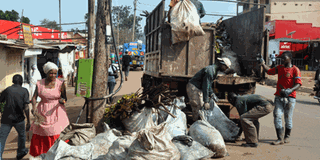Confusion as Rubaga suspends private garbage collectors

On duty. Employees of a private garbage collection company collect garbage in Rubaga Division yesterday. PHOTO BY SHABIBAH NAKIRIGYA
What you need to know:
- Unclear. Whereas the Division authorities say they have suspended services of private garbage collectors, the latter claim they are still in business.
- To much waste. Poor garbage disposal is still a big challenge to many urban centres across Uganda as it is the case in many African countries.
- According to Mr Byansi Zziwa, the KCCA waste management supervisor in charge of Rubaga Division, a total of 9,000 tonnes of garbage is collected from Rubaga Division alone in three months, meaning every month, they collect 3,000 tonnes. Rubaga Division has 105,000 households.
Kampala: After months of back-and-forth squabbles, authorities in Rubaga Division, Kampala, have suspended operations of private firms which have been collecting solid waste in the area.
Although residents and the business community have welcomed the suspension of the garbage collectors, the latter claim they are still on duty.
The companies that were contracted by KCCA to collect the garbage in Rubaga Division are Homeklin Uganda Ltd and Nabugabo Up Deal.
The Rubaga Division Mayor, Ms Joyce Ssebugwawo, said they decided to suspend the garbage contractors in a council meeting, a decision she said was aimed at empowering the local residents themselves to manage garbage generated in their localities.
She insisted that the private companies were incompetent and also demanded exorbitant fees from residents.
She added that they recommended people who are ready to recycle the solid waste but authorities at City Hall, the seat of Kampala Capital City Authority (KCCA), are still reluctant to approve them.
“We want to resume collecting garbage ourselves as we were doing it before without charging any money because it’s our duty as Division leaders to provide free services to our people since they pay taxes,” She added.
When this newspaper contacted KCCA spokesperson Peter Kauju on the matter, he referred this reporter to Mr Robert Kalumba, a KCCA staff, saying he was not in office at the time.
Mr Kalumba said the Authority had not received any official communication from Rubaga Division about the suspension of private garbage collection companies.
“May be they are yet to write to us,” Mr Kalumba said.
According to Mr Byansi Zziwa, the KCCA waste management supervisor in charge of Rubaga Division, to suspend operations of private garbage collectors, Rubaga Division has to pass a resolution, which has to be endorsed by KCCA for implementation by the policy makers.
“Once they endorse the resolution, they have to communicate to the technical department of KCCA, but this has not been done. So we are not aware of the said suspension of private firms. We are still waiting for that to happen,” Mr Zziwa said.
In the meantime, Mr Zziwa said residents have to continue paying the garbage fees to enable the private companies keep the area clean.
He explained that if city dwellers, especially those in Rubaga, do not want to pay for solid waste, they should, through their councillors, push for the amendment of the Ordinance on solid management waste.
“And whoever pushes for the suspension of private garbage collectors should know that it requires amendment of the law, and stopping them also has financial implications,” Mr Zziwa warned.
Poor garbage disposal
In Kampala, the poor garbage disposal has always been attributed to the loopholes in city wastes law. Waste disposal is provided for under the city Solid Waste Management Ordinance, 2000.
The Ordinance states that every owner or occupant of a dwelling or commercial premises, is responsible for waste generated at those premises until it is collected by the Authority.
It is illegal and punishable to dump garbage in places where it may be or become a public health nuisance. These places include water bodies, public streets and the roadside.
But Ms Ssebugwawo insists that some sections of the Ordinance need to be reviewed.
She reasons that city dwellers, especially those who stay in slums, cannot afford to pay garbage collection fees.
“It is very clear that the companies operate mainly in planned residential areas and avoid the slums because residents there cannot pay for their garbage,” she reasons.
Reacting to this current impasse, Mr Isaac Katureebe, the director of Homeklin Uganda Limited, one of the private firms KCCA contracted to collect garbage in Rubaga Division, explained that the company was still working in the area and they had not yet received any official communication regarding suspension of their services.
On the issue of charging exorbitant fees from city dwellers, Mr Katureebe said their charges are relatively affordable.
He wondered why some people in Rubaga Division don’t want to pay for their garbage yet they were doing so before his company was awarded a contract.
“The difference is that initially, people were paying money to individuals to collect their garbage and could dump it by the roadside, making our city dirty. For us, we transport it in an organised manner and dump it at the gazetted landfill in Kiteezi,” Mr Katulebe said.
He added that the company collects 100 tonnes of garbage every day and they do not expect people to complain about uncollected garbage.
However, Mr Christopher Kintu Kayabula, a resident of Kosovo village in Rubaga Division, said private garbage collectors rarely visit the area and sometimes it takes them days to collect garbage in the village.
“It appears like they (garbage collectors) have few trucks yet they are supposed to serve a bigger area. Sometimes garbage is collected and put near people’s shops and they delay to collect it, which usually creates a bad smell around ,” he said.
A fortnight ago, Rubaga South MP Paul Kato Lubwama said he had started mobilising his electorate to form community-based organisations, which can be entrusted to collect garbage in the area.




